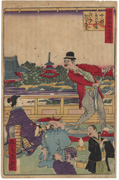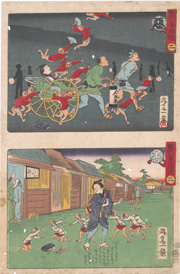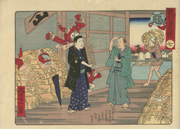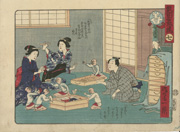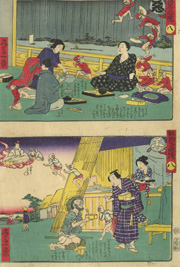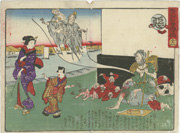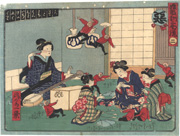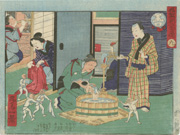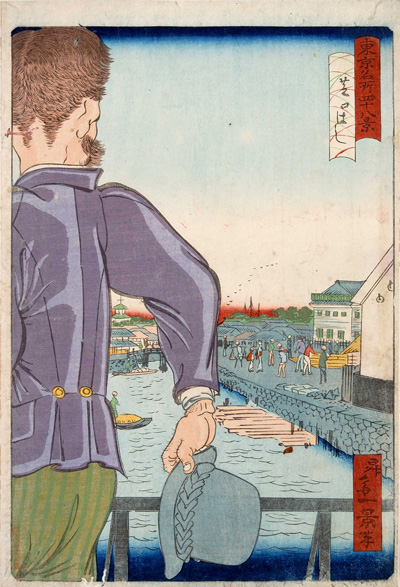Prints in Collection
IHL Cat. #1168 | No. 7, Greedy Merchant and Solicitous Merchant from the series A Didactic Mirror of Good and Evil, 1872 IHL Cat. #526 (top print) IHL Cat. #527 (bottom print) |
IHL Cat. #2271 |
Biographical Data
Biography
Shōsai Ikkei 昇斎 一景(fl. c. 1870s)
Sources: A Dictionary of Japanese Artists: Painting, Sculpture, Ceramics, Prints, Lacquer, Laurance P. Roberts, Weatherhill, 1976, p. 52; The Hotei Encyclopedia of Japanese Woodblock Prints, Amy Reigle Newland, Hotei Publishing Company, 2005, p. 504; Wikipedia Japan http://ja.wikipedia.org/wiki/%E6%98%87%E6%96%8E%E4%B8%80%E6%99%AF
Little is known about this artist's life. He was a student of Utagawa Hiroshige III (1842–1894) and was active between 1860 and the late 1870s. He produced meisho-e of a radically changing Tokyo and comic scenes (giga) of Edo Life in the early Meiji Era, such as Comic Scenes of Thirty-six Famous Places in Tokyo (Tōkyō meisho sanjūroku gisen, 1871-1872). His most famous work was the series Forty-Eight Famous Views of Tokyo (Tōkyō meisho shijūhakkei, 1871), an example of which is shown below.
Jonathan Solomon, in his article titled "Bridging Edo and Meiji, Shōsai Ikkei's Comic Views of Early Tokyo"1 states:
By the calculations of Hatakeyama Yutaka, a curator at the Machida City Museum in surburban Tokyo where he organized in 1992 the only exhibition ever held on the the art of Shōsai Ikkei, the artist left a total known oeuvre of 132 prints (of which 24, or one fourth, were triptychs) plus six picture-books, all in color woodblock.
Solomon goes on to provide us with he calls "the sole scrap of biographical data" on the artist from Sansantei Yūjin (identity unknown) who wrote a brief text on Ikkei appearing in the table of contents of his series Forty-Eight Famous Views of Tokyo, to wit:
From this..., we learn only that Ikkei took a liking to the work of Maruyama Ōkyo (1733-1795), founder of the Shijō School, and hence traveled to Kyoto to study. He applied himself with diligence, but then decided to retire from the world. Only later - presumably now in Tokyo after the Restoration - did he respond to the entreaties of publishers and begin to produce numerous works.
Solomon also speculates on "the remote possibility" that Ikkei may have been one and the same with the artist Utagawa Hirokage 歌川広景.
Art names ("gō") include Ikkei 一景, Isshōsai 一昇斎 , and Shōsai 昇斎
Forty-Eight Famous Views of Tokyo: Shibakuchibashi Bridge
東京名所四十八景 芝口はし, 1871
1 "Bridging Edo and Meiji, Shōsai Ikkei's Comic Views of Early Tokyo" appearing in Impressions: The Journal of the Ukiyo-e Society of American, Inc., Number 21, 1999, p. 43-53.
last revision:
東京名所四十八景 芝口はし, 1871
Signatures and Seals (A Few Examples)
 昇斎一景筆 |  ōju Shōsai Ikkei hitsu / unread seal 應需 昇斎一景筆 |  昇斎一景筆 |  Shōsai Ikkei Shōsai Ikkei昇斎一景 |  Shōsai hitsu Shōsai hitsu 昇斎筆 |  昇斎一景戯画 |
1 "Bridging Edo and Meiji, Shōsai Ikkei's Comic Views of Early Tokyo" appearing in Impressions: The Journal of the Ukiyo-e Society of American, Inc., Number 21, 1999, p. 43-53.
last revision:
4/29/2020

![[The Dam] on the Otonashigawa at Ōji (No. 36) from the series Thirty-six Views of Tokyo](shosai-ikkei-fl-c-1870s/Ikkei Tokyo sanjurokukei sanj-b1c461e1e756bb0.jpg)
